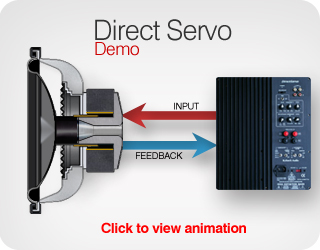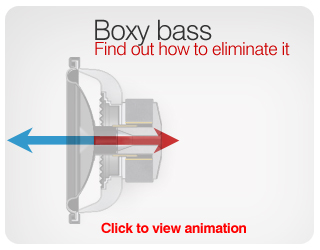The secret of audiophile bass is our Direct Servo technology. Many believe that accuracy is simply a matter of achieving low distortion. In reality there is more to achieving an accurate reproduction. Here we'll introduce concepts such as "bass re-radiation" and "memory effects." Others are silent on these issues because they don't want you to be concerned about how poorly their products perform in those areas. We discuss them because we believe they are widely neglected problem areas for which we have found a unique and highly effective solution.
Featured articles
Direct Servo - how it works
- Direct Servo is a patented technology that dramatically reduces many different problems which prevent conventional subwoofers from reproducing accurately.
view article
Boxy bass - find out how we eliminate it
- All box subwoofers have serious problems with the sound waves from the rear of the driver seriously degrading definition. This is a problem that an over-designed solid box can't fix. A different solution is required. Learn more about this problem and our unique solution.
view article
What killed the music? - how we reduce memory effects
- Have you ever wondered why most subwoofers fail to reproduce music accurately? One of the main causes of this problem are memory effects. While good driver design can help, the only practical and effective way to significantly reduce this problem is to use a closed loop servo system.
view article
Smart Q - high output without kilowatts of power
- Most subwoofers on the market are horrendously inefficient. Many need extreme power amplifiers to overcome this problem. Many are impressed at first with subwoofers which use kilowatts of power, thinking they must have extreme output. In reality, our sensibly powered and intelligently designed subwoofers will achieve the same output (if not more) with greater accuracy and less cost.
view article
Closing the loop - why every subwoofer should use feedback
- Why do most subwoofers fail to reproduce music accurately? One of the main reasons for this is that the driver is out of control. A conventional subwoofer is an open loop. The servo feedback used in Direct Servo completes the loop, and the result is a degree of control and accuracy that is not possible using any other method.
view article
Direct Servo technology: why do we need it?
When it comes to accurately reproducing bass, most subwoofers fail miserably. While many subwoofers are good enough to shake the room with home theatre low frequency effects, discerning enthusiasts expect more. While some "high end" subwoofers may seem perform at an acceptable level, once one experiences the realism and dynamic impact of a Direct Servo subwoofer, it is very difficult to go back.
A servo is essential in a subwoofer that aims to be true to the original. The benefits are clear:
![]() No voice coil thermal-induced compression or distortions.
No voice coil thermal-induced compression or distortions.
![]() Spider and surround distortion reduced by 6 - 9 dB
Spider and surround distortion reduced by 6 - 9 dB
![]() Flat frequency response that is less dependent on T/S parameters.
Flat frequency response that is less dependent on T/S parameters.
![]() Audiophile bass sound at an affordable price: articulate, tight, transparent, and well-defined bass
Audiophile bass sound at an affordable price: articulate, tight, transparent, and well-defined bass
![]() Applicable to all subwoofer configurations (including horns, dipole, infinite baffle and others)
Applicable to all subwoofer configurations (including horns, dipole, infinite baffle and others)
![]() Higher output (with better excursion utilization) for sealed, IB, and Dipole subs.
Higher output (with better excursion utilization) for sealed, IB, and Dipole subs.
These benefits are all unique to a servo controlled subwoofer, and can't be achieved in a practical and affordable way in a conventional subwoofer.
How is Direct Servo different to other servo subwoofers?
Our philosophy is to make audio products as simple as they can be. Less is more. Our subwoofers put as little into the signal path as possible. This approach applies to our amplifiers, Direct Servo technology and drivers. Most servo subwoofers use an accelerometer, which is another mechanical system with its own limitations. Also extensive protection circuits are required, and these further degrade the signal. As a result, accelerometer based servos are not as accurate as Direct Servo. The superiority of Direct Servo is derived from its simplicity.
Direct Servo uses a very thin sensing coil which is wound adjacent to the voice coil. The coil acts as a custom made microphone which creates a signal which is then used to correct any difference from the original signal. Any non linearities are instantly corrected.
Learn more about how our servo system is different ![]()
Learn more
- Adaptive EQ - learn how Direct Servo adapts intelligently to changing conditions
 View article
View article 
- Servo systems compared - learn about the different servo systems
 View article
View article 
- Components - learn about the components we use in our amplifiers
 View article
View article 
- DSP - how is it different to Direct Servo?
 View article
View article 

